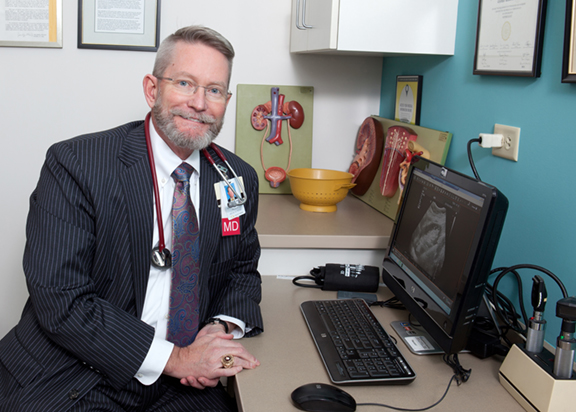Nephrology Associates of Tidewater, Ltd

Dr. Thomas McCune has worn many hats during his long, successful career as a nephrologist: physician, researcher, educator, author, soldier, leader in national transplant societies and international lecturer.
After nearly three decades in practice, he can look back in gratitude at how much kidney care has advanced, even as he embraces the multiple medical breakthroughs he sees on the horizon.
“Some of the discoveries being made today will reshape this specialty,” Dr. McCune says. “It is very exciting and gratifying to be able to give more and more people with kidney disease or total organ failure – people relying on a dialysis machine to stay alive – a chance for a healthy, normal life.”
As a partner at Nephrology Associates of Tidewater in Norfolk, Dr. McCune commonly treats patients with diabetes complications, severe hypertension and genetic disorders such as polycystic kidney disease. He is proud to say he has managed the care of some patients for decades, from their initial diagnosis of kidney disease, through dialysis and on to successful transplantation.
Dr. McCune serves as Primary Physician for the Pancreas Transplant Program at Sentara Norfolk General Hospital and Medical Director of Fresenius Kidney Care of Greater Norfolk. At Eastern Virginia Medical School, he is the Chair of the Division of Nephrology and Fellowship Program Director. He holds the rank of Associate Professor and has won several teaching awards.
As a researcher and instructor, Dr. McCune has had a hand in developing some of the newest medical tools in his specialty. One example is tolvaptan, a promising medication for adults with Autosomal Dominant Polycystic Kidney Disease that could gain FDA approval later this year. “In clinical trials, this drug slowed the decline in kidney function, keeping patients off dialysis longer,” Dr. McCune says.
Researchers also have identified a genetic marker highly associated with the development of kidney failure in young African-Americans. The next step is to identify which secondary factors might trigger the disease in affected carriers, such as certain infections, and develop treatment and prevention plans.
Since the kidney has so many functions in the body, one discovery goes well beyond nephrology, Dr. McCune adds. A recently recognized hormone called klotho is produced by healthy kidneys and appears to improve memory and motor skills in mice. In humans, researchers have discovered high levels of the chemical in very elderly people who have no cardiovascular disease or cognitive impairment. “There is great hope that klotho may be part of the recipe that we use to lengthen life,” Dr. McCune notes.
Those potential breakthroughs are on top of improved diagnostic techniques and post-transplant drugs that help physicians quickly identify complications and prevent organ rejection. Today, the different types of rejection can be quickly diagnosed and treated, and opportunistic infections can be identified and controlled before the patient develops infection symptoms. These successes now allow virtually all patients functional transplanted kidneys a year after surgery.
Medicine was a natural choice for Dr. McCune, a lifelong learner and “Army Brat” who grew up primarily in Northern Virginia, Germany and Charlottesville. “I knew I wanted to be a doctor by junior high,” he recalls. “I wanted to understand all I could about the science of the body and what made it work.”
Dr. McCune majored in biology at The Virginia Military Institute and went on to medical school at EVMS, where he was drawn to the variety of nephrology, with a particular interest in how the kidneys helped maintain a precise fluid and electrolyte balance for good health.
Dr. McCune completed an internship and a residency in internal medicine at EVMS and two fellowship programs at Vanderbilt University Medical School, one in nephrology and one in transplantation. He then returned to Hampton Roads to establish his medical career, which has included frequent participation in clinical trials and publication of peer-reviewed manuscripts, chapters and commentaries.
In addition, Dr. McCune has served for 32 years in the Army Reserve and National Guard. He was deployed to Germany during Operation Desert Storm and to Afghanistan and Iraq in 2004, 2006 and 2010, serving as a forward-deployed surgeon for an infantry battalion, an air assault aviation battalion and an aviation brigade. He retired in 2016 as a Colonel in the Medical Corps.
Dr. McCune returned to Iraq just last year at the invitation of the Kurdish Regional Government to lecture and participate on teaching rounds. While there, he treated patients at hospital clinics and visited refugee camps close to the Syrian border. “As a former soldier in Iraq, it was good to see the region limp toward an improved future,” he says.
Recognizing that medicine is advanced through policy as well as practice, Dr. McCune has led the South-Eastern Organ Procurement Foundation and served on many of its committees. He is also active with the American Transplant Society, having chaired scientific sessions and the Patient Care and Education committee, which was responsible for rewriting the society’s ethics statement.
Married with three grown children, Dr. McCune enjoys travel, cooking and advancing his knowledge of the wines of the world. As he edges closer to retirement, his work with fellowship students has left him confident about the future of kidney care in the region.
“All patients deserve the best of care,” he says. “Fortunately, this is a place they can find it.”

